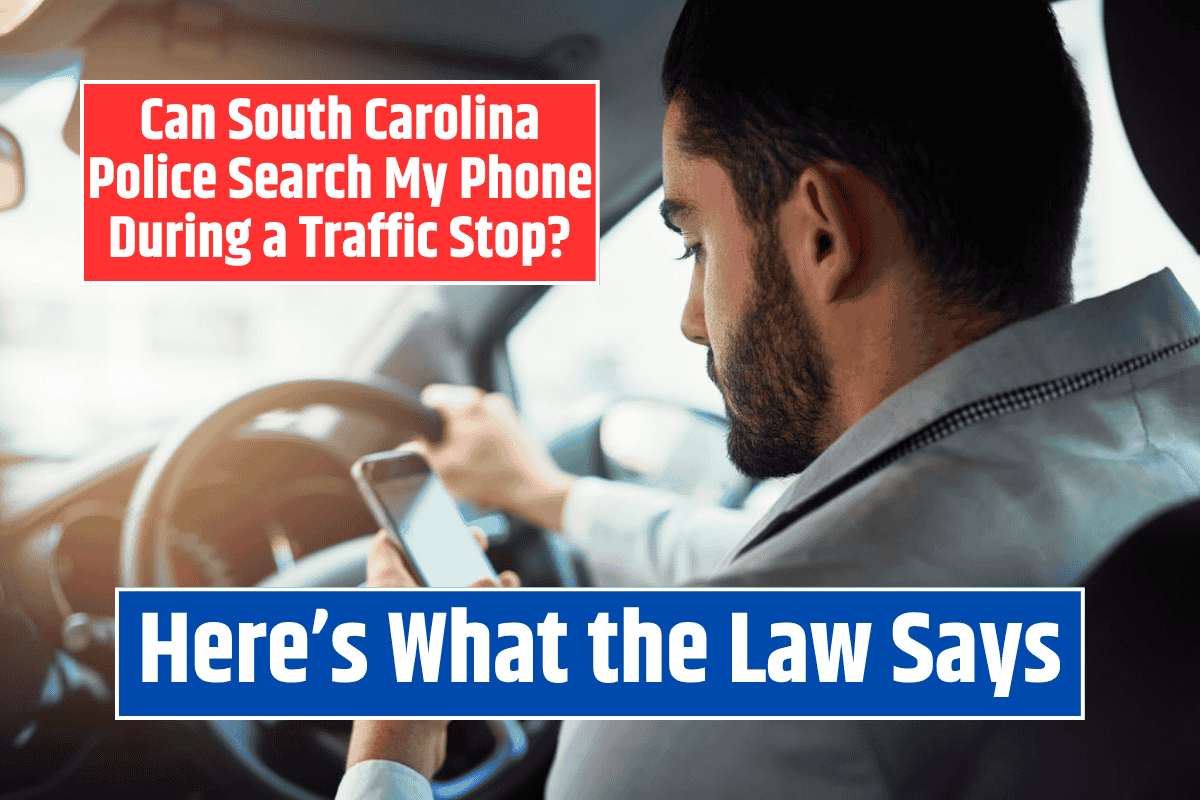If you’re pulled over in South Carolina, it’s essential to understand your rights, particularly regarding searches of your vehicle and personal items, like your phone.
While police can search your vehicle under certain conditions, they cannot search your phone during a traffic stop unless they meet specific legal requirements.
Here’s an overview of the law regarding phone searches, vehicle searches, and other crucial rights during a traffic stop.
What You Need to Know During a Traffic Stop
When you’re stopped by the police, it’s important to remain calm and respectful. Here are the key things you should know:
Pull Over Safely: Always pull over to the side of the road safely and promptly. Keep your hands visible to the officer at all times, and remain in your vehicle unless instructed otherwise.
Ask Why You Were Stopped: It’s your right to know why the police have pulled you over. Politely ask the officer the reason for the stop.
Provide Necessary Documents: You are legally required to provide your driver’s license, vehicle registration, and proof of insurance when asked. If you need to reach for these documents, inform the officer before doing so.
Right to Remain Silent: Beyond providing your identification information, you have the right to remain silent. You are not obligated to answer any further questions, such as where you’re coming from or where you’re going. You can politely decline to answer.
Ticket Issuance: If you receive a ticket, you are required to sign it. However, signing the ticket does not imply that you admit guilt; it only acknowledges that you have received the citation.
Can the Police Search My Vehicle?
Police can search your vehicle under certain conditions:
Probable Cause: If the officer has probable cause to believe that there is evidence of a crime in your vehicle, they may conduct a search without your consent or a warrant. Probable cause can arise from factors like suspicious behavior, the smell of drugs, or seeing illegal items in plain view.
Warrant: If the officer does not have probable cause, they must obtain a warrant to search your vehicle, including the trunk.
If the police do not have a warrant or probable cause, you have the right to refuse the search. It’s crucial to stay polite when declining the search, as this is your right, but refusing does not give the officer a reason to escalate the situation.
Can the Police Search My Cell Phone?
In South Carolina, police cannot search your phone during a traffic stop without probable cause or a warrant. The Fourth Amendment protects you from unreasonable searches, and the U.S. Supreme Court has ruled that police cannot search your phone without a warrant unless they have a clear reason to believe the phone contains evidence of a crime.
For example, if the officer believes your phone contains evidence related to the crime they suspect you of, they may attempt to obtain a warrant. In most cases, the police must respect your privacy and obtain proper legal authorization before inspecting your phone.
Is Excessive Force Allowed During a Traffic Stop?
No, excessive force is not allowed during a traffic stop in South Carolina. Police officers must follow strict guidelines regarding the use of force. If you feel that the officer has used excessive force during the stop, it’s important to document the incident, take note of any witnesses, and contact an attorney immediately.
Even though many officers wear body cameras, incidents of excessive force can still occur, and legal action may be necessary.
Do Passengers Have to Show ID?
In South Carolina, passengers are not required to provide identification during a routine traffic stop. While the driver must show their driver’s license, proof of insurance, and vehicle registration, passengers do not have to present identification unless they are being specifically detained or arrested for another reason.
This is an important distinction to know if you’re a passenger, as you’re not obligated to provide your ID unless there’s a legal reason to do so.
Can I Refuse to Answer Questions During a Traffic Stop?
Yes, you have the right to refuse to answer questions during a traffic stop. Even if you are completely innocent, it’s often wise to exercise your right to remain silent.
The police may ask about where you’re coming from, whether you’ve been drinking, or other similar questions, but you are not required to answer them. Politely informing the officer that you prefer to remain silent can help protect your rights and prevent misunderstandings.












